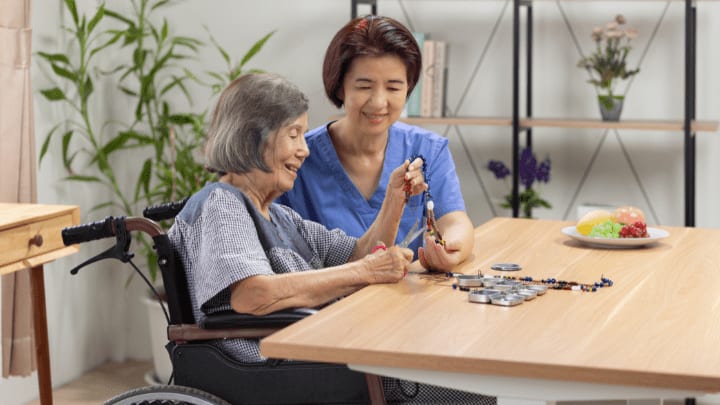What is Dementia?
This term describes various symptoms linked with a decline in cognitive function, including memory, thinking, and behavior. It is caused by multiple underlying medical conditions that affect the brain. While dementia is often associated with aging, it's important to remember that it's not a normal part of the aging process. Early detection and diagnosis are crucial for managing symptoms and improving quality of life.
Common Types of Dementia
-
Alzheimer's Disease: This is the most common type, accounting for 60-80% of all cases. Alzheimer's is characterized by the buildup of proteins in the brain, triggering the destruction of brain cells and a gradual decline in brain function.
-
Vascular Dementia: This type is caused by reduced blood flow to the brain, often due to a stroke or a series of small strokes. Symptoms may come on suddenly or gradually, including difficulty with problem-solving, slowed thinking, and changes in mood or behavior.
-
Lewy Body Dementia: This type of dementia results from uncommon protein deposits, called Lewy bodies, in the brain. Symptoms can include visual hallucinations, fluctuating cognition, and movement disorders similar to Parkinson's disease.
-
Frontotemporal Dementia: This type of dementia is caused by the degeneration of the frontal and temporal lobes, which can cause changes in personality, behavior, and language skills.
Early Warning Signs of Dementia
Understanding the early signs of dementia is essential for seeking timely medical attention and potentially slowing the progression of the condition. Some of the most common early symptoms look like:
-
Memory Loss: Problems remembering recent events or important information, such as appointments or conversations.
-
Difficulty with Problem-Solving or Planning: Struggling to follow a plan or complete familiar tasks, such as balancing a checkbook or following a recipe.
-
Changes in Mood or Personality: Sudden or unexplained mood swings, such as increased irritability, anxiety, apathy, or a shift in personality.
-
Difficulty with Language: Trouble searching for the right words to express thoughts or communicate effectively.
-
Disorientation or Confusion: Getting lost in familiar places or having difficulty keeping track of time or date.
-
Decreased Judgment or Decision-Making Abilities: Making poor decisions or having trouble with tasks that require judgment, such as managing finances or driving.
-
Social Withdrawal: Avoiding social situations or activities that were once enjoyable.
If you or a loved one are experiencing any of these symptoms, it's essential to seek dementia care near Broken Arrow, OK. Early detection is crucial for effective management and improving quality of life. Don't hesitate to reach out to a healthcare professional for an evaluation.
Importance of Early Detection and Diagnosis
-
Timely Intervention: Many types of dementia, such as Alzheimer's disease, can be slowed or managed with early intervention. This may include medication, lifestyle changes, or cognitive-behavioral therapies.
-
Improved Quality of Life: Early diagnosis allows individuals and their families to plan for the future, adjust to their living situation, and access support services to keep independence and quality of life for as long as possible.
-
Opportunity for Research: Participation in clinical trials or research studies can provide access to treatments and contribute to the ongoing efforts to better understand and manage dementia.
-
Caregiver Support: Early diagnosis allows caregivers to learn about the condition, access resources, and develop strategies to provide the best care for their loved one.
Tips for Providing Support to Someone with Dementia
-
Educate Yourself: Learn about the specific type of dementia, its symptoms, and the best ways to communicate and provide support.
-
Establish a Routine: Maintain a daily routine to provide familiarity and security.
-
Encourage Independence: Allow the individual to participate in tasks and activities they can still do while assisting as needed.
-
Adapt the Environment: Adjust the individual's living space to promote safety and reduce confusion, such as removing clutter, using clear signage, and ensuring good lighting.
-
Encourage Social Engagement: Facilitate opportunities for the individual to engage in social activities, such as group outings or visits with friends and family.
Taking the Next Step
Dementia is a challenging journey, but understanding the early signs and taking proactive steps can significantly improve the quality of life for both the individual and their caregivers. Recognizing subtle changes in memory, behavior, or thinking empowers you to seek timely intervention and provide the necessary support.
Early diagnosis and treatment are crucial for managing dementia effectively. Our Iris Memory Care of Tulsa team is dedicated to providing compassionate care and expertise. We understand the complexities of this condition and offer a range of services tailored to meet the unique needs of individuals with dementia and their families. Contact us today at (918) 940-1800.


